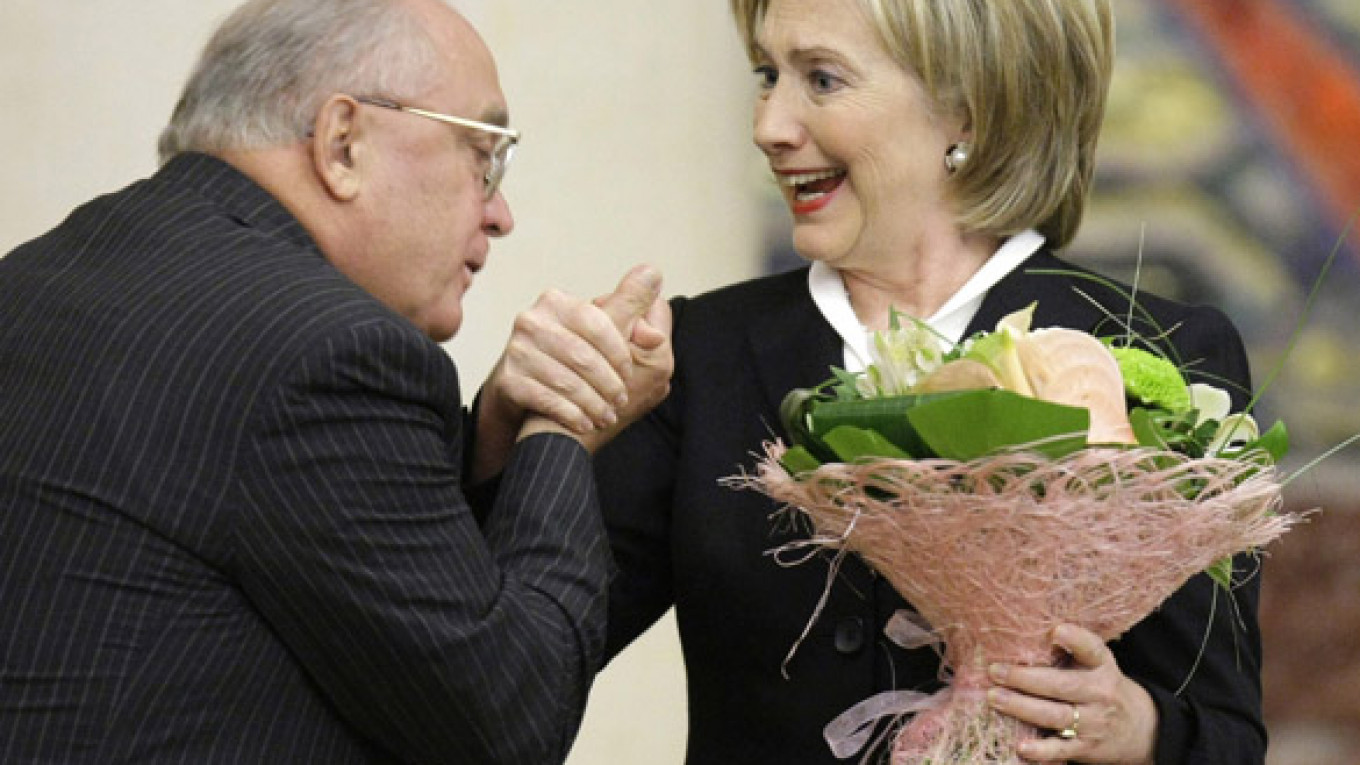KAZAN — Secretary of State Hillary Clinton on Wednesday challenged Russians to open up their political system and embrace diversity and dissent, saying Cold War-era thinking would limit their prosperity in the 21st century.
Clinton spoke to Moscow State University students and then traveled east to Kazan, the capital of Tatarstan. The informal meetings, which wrapped up a five-day tour of Europe, were aimed at helping redefine U.S.-Russia relations.
Clinton stressed to the students that Russia’s prosperity was dependent on its willingness to cultivate core freedoms, including the freedom to participate in the political process.
“Citizens must be empowered to help formulate the laws under which they live,” she told about 2,000 students at the university. “They need to know that their investments of time, money and intellectual property will be safeguarded by the institutions of government.”
Her message appeared aimed in part at countering the fears of Russia’s beleaguered liberal democrats that the United States would no longer seek to hold the Kremlin accountable for violations of democratic norms and human rights in exchange for Russia’s cooperation on Iran and Afghanistan.
“In an innovative society, people must be free to take unpopular positions, disagree with conventional wisdom, know they are safe to challenge abuses of authority,” Clinton said.
“That’s why attacks on journalists and human rights defenders here in Russia is such a great concern: because it is a threat to progress,” she said, standing in front of a monumental Soviet mosaic topped by a red hammer and sickle, the showcase of the university auditorium.
Clinton told the students that one of the books that most affected her life was “The Brothers Karamazov” by Fyodor Dostoevsky, in particular the parable of the Grand Inquisitor, which she saw as “an object lesson against servitude.”
“I believe one of the greatest responsibilities we have as human beings is to open ourselves up to the possibility that we could be wrong,” she said. “One of the greatest threats we face is from people who believe they are absolutely, certainly right about everything and they have the only truth and it was passed onto them by God.”
Clinton returned to a favorite theme of President Barack Obama’s — the need to move past the Cold War.
“We have people in our government and you have people in your government who are still living in the past,” she said. “They do not believe the United States and Russia can cooperate to this extent. They do not trust each other and we have to prove them wrong.”
In closing, she expressed hope that Russians and Americans would come to feel like partners.
“I choose partnership and I choose to put aside being a child of the Cold War. I choose to move beyond the rhetoric and the propaganda that came from my government and yours,” she said. “I choose a different future and that’s a choice every one of us can make every single day and I look forward to sharing that future with you.”
The students responded with polite applause.
The United States is seeking Russia’s support for tough new sanctions if Iran fails to prove its nuclear program is peaceful. But Prime Minister Vladimir Putin warned against intimidating Iran and said talk of sanctions were “premature.” “There is no need to frighten the Iranians,” Putin told reporters in Beijing after a meeting of the Shanghai Cooperation Organization on Wednesday.
In an interview that aired Wednesday on ABC’s “Good Morning America,” Clinton insisted she was still “very pleased by how supportive the Russians have been.” “I believe if sanctions become necessary, we will have support from Russia,” she said.
Clinton said she chose to travel to Kazan because she heard that it was a beautiful city where Muslims and Orthodox Christians live peacefully together. “I want to see that for myself and hear how successful that has been,” she said in an interview on Ekho Moskvy radio Wednesday.
She is the first U.S. secretary of state to visit Kazan, which bills itself as Russia’s third capital, and Tatarstan, an oil-rich moderate Muslim-majority republic that is often hailed as a model of multicultural tolerance. Clinton was met at the airport by Tatarstan’s longtime leader, Mintimer Shaimiyev, who took her on a tour of the Kazan Kremlin, including its Kul Sharif Mosque and Annunciation Cathedral.
“You are well-known as someone who has fostered religious tolerance,” she told Shaimiyev. “It really is a wonderful example of what can be done if people work together.”
Clinton departed for Washington late Wednesday.
A Message from The Moscow Times:
Dear readers,
We are facing unprecedented challenges. Russia's Prosecutor General's Office has designated The Moscow Times as an "undesirable" organization, criminalizing our work and putting our staff at risk of prosecution. This follows our earlier unjust labeling as a "foreign agent."
These actions are direct attempts to silence independent journalism in Russia. The authorities claim our work "discredits the decisions of the Russian leadership." We see things differently: we strive to provide accurate, unbiased reporting on Russia.
We, the journalists of The Moscow Times, refuse to be silenced. But to continue our work, we need your help.
Your support, no matter how small, makes a world of difference. If you can, please support us monthly starting from just $2. It's quick to set up, and every contribution makes a significant impact.
By supporting The Moscow Times, you're defending open, independent journalism in the face of repression. Thank you for standing with us.
Remind me later.


